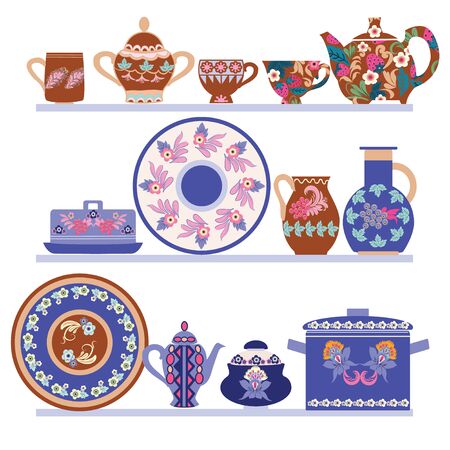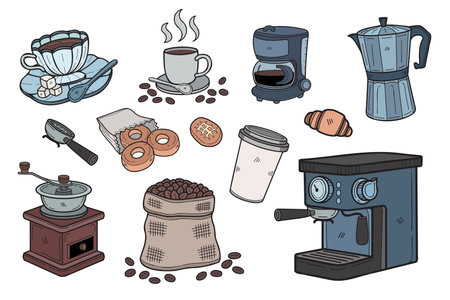Introduction to Indian Coffee Culture
Coffee in India is more than just a beverage; it is a ritual woven into the fabric of daily life, particularly in the southern states like Karnataka, Kerala, Tamil Nadu, and Andhra Pradesh. The story of Indian coffee begins in the 17th century, when Baba Budan, a legendary Sufi saint, is said to have smuggled seven coffee beans from Yemen and planted them in the hills of Chikmagalur, Karnataka. From these humble beginnings, coffee cultivation flourished across the Western Ghats, eventually making India one of the world’s largest producers of high-quality Arabica and Robusta beans. Today, Indian homes—especially in the South—are filled with the aroma of freshly brewed filter coffee every morning. Families gather around steaming cups as part of their daily routine, reflecting an intergenerational tradition where recipes and brewing techniques are passed down through generations. This deep-rooted coffee culture not only shapes daily habits but also plays a significant role during social gatherings and festive occasions, symbolizing warmth, hospitality, and togetherness within Indian households.
2. Coffee and Family Rituals
Coffee holds a special place in the tapestry of Indian family life, transcending its role as just a beverage to become an integral part of cherished rituals and daily routines. In many Indian homes, especially in the southern states like Karnataka, Tamil Nadu, and Kerala, coffee is not merely consumed for its taste but is woven into the very fabric of hospitality and togetherness. The aroma of freshly brewed filter coffee often marks the beginning of the day, serving as both a wake-up call and a moment for families to gather, share stories, and plan their day.
The ritual of making coffee—often involving the traditional South Indian filter—becomes a daily act of care. Elders pass down their signature brewing techniques to younger generations, reinforcing family bonds and preserving heritage. This everyday ritual is a silent testimony to the importance of tradition in Indian culture, where even small acts have deeper meanings and connections.
When guests arrive, offering coffee is considered a gesture of warmth and respect. The coffee served is often accompanied by snacks such as murukku, vadas, or biscuits, creating a welcoming atmosphere that reflects the age-old Indian value of Atithi Devo Bhava (the guest is God). During festivals and special occasions, coffee takes on an even more significant role, bringing families together over long conversations and laughter.
| Occasion | Coffee Tradition | Cultural Significance |
|---|---|---|
| Morning Routine | Freshly brewed filter coffee shared among family members | Symbolizes unity and sets a positive tone for the day |
| Family Gatherings | Coffee served with traditional snacks | Encourages bonding and intergenerational storytelling |
| Festivals & Celebrations | Special blends or spiced coffee prepared for guests | Represents hospitality and festive spirit |
| Guest Visits | Coffee offered as first refreshment upon arrival | Shows respect and embodies the principle of welcoming guests as divine beings |
The enduring presence of coffee in these rituals highlights its role beyond mere consumption. It becomes a medium through which values are transmitted, relationships are nurtured, and memories are created. In every cup shared under an Indian roof, one can taste not just coffee but also the rich heritage of familial love and cultural pride.

3. Regional Variations: From Filter Kaapi to Instant Coffee
India’s coffee culture is a vivid tapestry, woven from the diverse traditions of its many regions. While tea may be the beverage of choice in much of North India, the southern states—Karnataka, Tamil Nadu, Kerala, and Andhra Pradesh—are synonymous with the rich aroma of freshly brewed filter coffee, fondly called filter kaapi. This style of coffee is more than just a drink; it’s an integral part of daily life and family gatherings, often prepared with meticulous care using a traditional metal filter and served in a dabara-tumbler set.
The Ritual of South Indian Filter Coffee
South Indian homes pride themselves on their unique method of preparing coffee. The process begins with roasting and grinding high-quality beans, often blended with chicory for added body. Hot water is gently poured over the grounds in the filter, producing a strong decoction that forms the soul of kaapi. This is then mixed with boiling milk and sugar to taste, resulting in a creamy, aromatic brew. The artful act of pouring the coffee back and forth between two vessels—a technique known as “metering”—not only cools the drink but also creates its signature frothy top. Sharing a cup of filter coffee is seen as an expression of warmth and hospitality across generations.
Coffee Across India: Local Preferences and Adaptations
Beyond the South, coffee has found its own space in various corners of India. In cities like Kolkata and Mumbai, coffee houses have become iconic social hubs where intellectuals gather over cups of milky coffee or strong espresso-style brews. In recent decades, instant coffee brands such as Bru and Nescafé have made their mark in Indian kitchens, offering quick and accessible alternatives to traditional preparation methods. Many families have adapted these modern versions to suit local tastes—some prefer their instant coffee extra sweet, while others add spices like cardamom or cinnamon for a distinctive twist.
A Blend of Heritage and Innovation
What truly defines Indian coffee traditions is the harmonious blend of old and new. While urban youth embrace café culture and experiment with cappuccinos or cold brews, many still cherish their roots by returning home for a cup of mother’s hand-filtered kaapi. Each region’s adaptation reflects both global influences and deep-seated family heritage, making every cup an authentic experience that celebrates India’s pluralistic spirit.
4. Heirlooms and Stories: Passing Down Coffee Traditions
Within Indian households, coffee is not merely a beverage—it is a living tradition interwoven with family memories and cultural identity. The ritual of making and sharing coffee is often accompanied by stories of ancestors, special occasions, and the subtle passing down of secrets that make each family’s brew unique. In South India especially, where filter coffee has become iconic, the preservation of recipes and techniques is an act of honouring one’s roots.
The Journey of Family Recipes
Coffee recipes in Indian homes are rarely written down; instead, they are shared orally, becoming richer with each generation’s touch. Grandmothers teach daughters and granddaughters how to blend the right proportions of chicory and coffee powder, how to time the decoction perfectly, and the importance of using freshly boiled milk. Such practices transform ordinary mornings into meaningful rituals that echo across generations.
Utensils as Heirlooms
The utensils used in brewing filter coffee—such as the traditional brass or stainless steel filter, ‘dabara set’ (a small tumbler and bowl), or even antique grinders—are treasured family possessions. These items often carry stories of weddings, festivals, or journeys across regions. They are polished and preserved meticulously, standing as silent witnesses to evolving customs while maintaining a connection to the past.
Common Coffee Heirlooms in Indian Families
| Heirloom Item | Significance | Typical Use |
|---|---|---|
| Brass Filter | Symbol of South Indian tradition, passed from elders to youngsters | Brewing strong decoction for filter coffee |
| Dabara Tumbler Set | Often gifted at weddings; marks hospitality and warmth | Serving frothy filter coffee with style |
| Hand Grinder (Chakkis) | Represents old-world charm; sometimes decades old | Grinding fresh roasted beans for daily use |
| Coffee Storage Jars | Bearing family initials or motifs; evoke nostalgia | Preserving freshness and aroma of ground coffee powder |
The Art of Brewing Across Generations
The technique behind a perfect cup—pouring water over grounds just so, waiting for the right strength, aerating milk for that signature froth—is as much an art as it is a science. Each family has its own tweaks: some add jaggery or cardamom for flavour, while others follow the classic path. These methods are discussed at kitchen tables and during evening gatherings, sometimes fiercely guarded as family secrets.
The Emotional Connect
Sharing coffee in Indian homes is also about storytelling. Children listen wide-eyed as elders recount tales of how their grandparents sourced beans from Coorg estates or smuggled filters across state lines during migrations. Every sip thus becomes a celebration—not only of taste but of legacy, belonging, and cultural pride. Through heirlooms and oral traditions, Indian families ensure that their love for coffee remains timeless.
5. Symbols of Warmth and Bonding
Within the comforting walls of Indian homes, coffee—lovingly called ‘kaapi’ in the south—transcends its role as a mere beverage to become a cherished symbol of warmth, togetherness, and heartfelt hospitality. The simple act of brewing and sharing kaapi is imbued with deeper meaning, serving as a thread that weaves family members, friends, and even neighbours into the social fabric of daily life.
The Ritual of Connection
In countless Indian households, offering a cup of coffee is more than a gesture; it is an unspoken invitation for conversation and connection. Whether it’s an early morning gathering on the veranda or an evening sit-down after a long day, the presence of kaapi signals a sacred pause—a moment to exchange stories, laughter, and concerns. It is during these times that bonds are strengthened and memories are forged, often passed down from one generation to the next.
Hospitality Rooted in Tradition
Hospitality holds immense value in Indian culture. When guests arrive at an Indian home—expected or not—the first question is often, “Will you have some coffee?” This customary offering goes beyond politeness; it reflects genuine care and respect for visitors. Serving freshly brewed filter coffee in steel tumblers or delicate cups becomes a tangible expression of warmth that lingers long after the last sip.
A Shared Experience Across Generations
The tradition of sharing kaapi is also a bridge between generations. Elders teach younger family members the precise art of preparing coffee: from selecting beans and roasting them to perfection, to the rhythmic pouring between tumbler and davara to create that signature frothy top. These rituals not only preserve culinary heritage but also foster a sense of belonging and continuity within families.
In essence, kaapi is more than just coffee—it is a living emblem of India’s familial bonds and enduring hospitality. Each shared cup carries with it centuries-old values of togetherness and affection, making every sip both a celebration of heritage and an act of love.
6. Contemporary Influences and Evolving Trends
In recent decades, the landscape of coffee consumption in Indian homes has experienced a remarkable transformation, shaped by the tides of modernity and globalisation. While the roots of traditional filter coffee and familial rituals remain deeply embedded in South Indian households, contemporary lifestyles are introducing new ways for Indians to enjoy their daily cup. The emergence of urban café culture, especially in cities like Bengaluru, Mumbai, and Delhi, has sparked an evolution in how coffee is perceived and consumed across generations.
The proliferation of international coffee chains alongside homegrown cafés has created a space where young Indians gather not just for caffeine but also for community, creativity, and conversation. These venues often blend global aesthetics with local flavours—think masala cappuccinos or filter coffee served alongside Italian pastries—reflecting a unique fusion that appeals to both tradition and trend. Coffee shops have become cultural hubs, influencing everything from work habits (with the rise of remote working) to social interactions among friends and families.
At home, evolving trends are visible in the kitchens as well. The younger generation is increasingly experimenting with brewing methods beyond the iconic stainless steel filter—embracing French presses, espresso machines, and pour-over techniques sourced from around the world. Social media platforms such as Instagram and YouTube have played a significant role in popularising DIY coffee recipes, latte art challenges, and even traditional South Indian decoction preparation among tech-savvy millennials and Gen Z.
However, this shift does not mean the disappearance of heritage. Many families continue to pass down secret coffee blends or specific brewing techniques as a cherished heirloom. In fact, some urban Indian homes are now blending both worlds: hosting traditional morning rituals while also enjoying occasional café-style indulgences at home on weekends.
The intersection of modernity and tradition in India’s coffee culture underscores the adaptability and resilience of family heritage. As Indians continue to traverse between the comfort of familiar rituals and the excitement of global trends, coffee remains more than just a beverage—it stands as a bridge connecting generations, geographies, and evolving aspirations.

